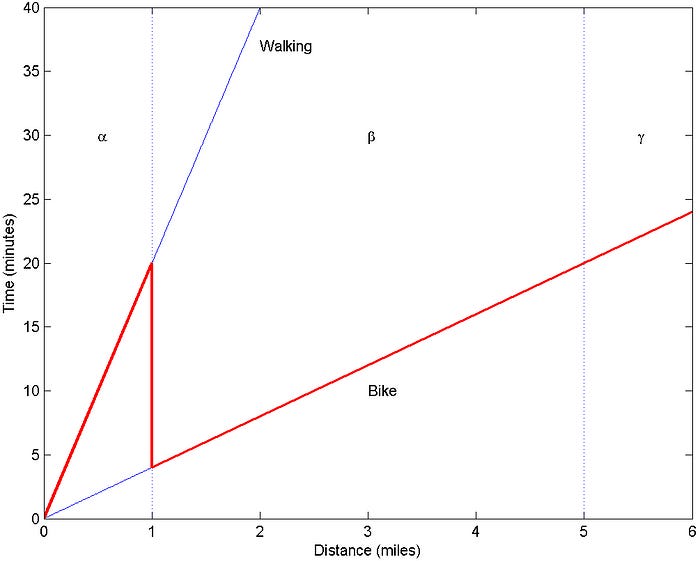The Region-Beta Paradox and its Impact on Product and Experimentation Thinking
Is mild user discomfort an acceptable goal?
Recently, I stumbled upon something called “The Region-Beta Paradox” (apparently I’m not the only one — image 1). However, I’m probably one of the few who upon discovering this phenomenon, hunted down and read the original paper. I really wanted to read and understand this over some watered down interpretation.
What is the Region-Beta Paradox?
The Region-Beta Paradox is a phenomenon whereby a person will remain in a state of mild discomfort and act only when the state changes to one of intense discomfort — i.e. interventions (going to see a doctor) can be chosen, but are not until the situation reaches a certain threshold (excruciating pain).
As a result, people in intense states are likely to recover faster than people in mild states. The reason for this is that intense experiences trigger psychological defense mechanisms, which help reduce the distress, while less intense experiences don’t trigger these defense mechanisms resulting in longer recovery periods. However, because people are unaware of these psychological processes, they may mistakenly expect intense states to last longer than mild ones.
To better visualise this phenomenon, let’s consider the following example from the paper I referenced earlier by Daniel Gilbert et al [1].
This example shows the relation between time and distance for a person who walks at 3 miles per hour (Blue Walking line), a person who bicycles at 15 miles per hour (Blue Bike Line), and a person who walks at 3 miles per hour to destinations that are less than a mile away and bicycles at 15 miles per hour to destinations that are more than a mile away (Bold Red line). Notice that for the third person (Bold Red line) it takes less time to reach any point in the beta region than to reach the shorter distances in the alpha region.
So by changing one’s mode of travel when the journey exceeds a critical distance, paradoxically, results in one arriving at a distant destination faster than a close destination, temporarily reversing the relationship between time and distance.
Changing the way we think about Product and Experimentation
We’ve covered a couple of examples in this post already but we see this phenomenon everywhere, for example a mildly unhappy employee will stay at their place of employment for much longer than someone who really hates their job, even if it does make their current overall situation worse. But what if this also applied to customers?
The main reason for introducing you to the region-beta paradox was so that I could put forward some thoughts about how we think about product development and experimentation. One of the major goals for product teams and teams running experiments is to improve the customer experience by reducing friction in the customer journey. We look for these pain points through qualitative studies such as user testing, session replays and other UX research methods. Some product tools out there will even go as far as creating a “frustration score” in an attempt to quantify a user’s level of discomfort.
I know the UX folks out there want to get to a place where they’re “delighting” customers but is it worthwhile? Feeling delighted is a bit of a stretch when I’m racing through a hundred products a week. Going through digital products in this day and age can be compared to a child opening 50 presents on their birthday. I have two young boys so I say this as an authority, their goal is not to bask in the joy of each present, it is to open all of them as fast as they can before inevitably playing with the same set of toys they’ve been playing with for the last 6 months.
My point is, instead of pouring months of resources into creating “delightful” experiences that don’t deliver any measurable uplift, maybe it’s good enough to get customers to a place of mild discomfort before any type of psychological defense mechanism kicks in that causes them to react and look elsewhere. Unless someone out there is offering a drastically superior experience or there are no better ways for you and your teams to spend their time, mild levels of frustration are probably not the problem to focus on — at least according to the research on human psychology.
Speaking from experience, my favourite products (LinkedIn, Meetup, Twitter) are so mildly infuriating that I just endure them even if slightly better options exist.
Closing thoughts
Are customers who experience mild discomfort on your product likely to endure it? Yes. Do we need to chase perfect customer experiences? I’m starting to think no! At least not for all products.
I know I’m probably going to get some backlash for this post as we’re supposed to be “customer-centric” but I’m also a realist and I hate wasting effort on things that are not adding value. I think imperfect products with a perfect market fit delivered at the right time are more important than poorly timed products that are perfect but indistinguishable and where no market fit can be found.
Please feel free to challenge me or point me towards studies which would argue with my thinking. These are just thoughts extrapolated from an interesting study I found.
References:
[1]https://web.archive.org/web/20160304110109/http://www.scn.ucla.edu/pdf/PeculiarLongevity.pdf
[2]https://en.wikipedia.org/wiki/Region-beta_paradox







Thanks for a concept I had not been familiar with! As for the impact on product development: I think the Kano model applies it. Caveat: With respect to Kano it's import to understand that using it requires quite rigorous analysis. Otherwise you end up with an assumption-driven fairy tale, similar to RICE, and might as well just throw some dice.